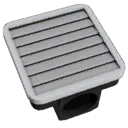Difference between revisions of "Passive Vent"
From Unofficial Stationeers Wiki
(elaborated on the functionality of the passive vent) |
|||
| Line 10: | Line 10: | ||
== Description == <!--T:1--> | == Description == <!--T:1--> | ||
| − | Permits gasses to go through when connected to a pipe network. | + | Permits gasses to go through when connected to a pipe network. |
| + | |||
| + | You can think of a passive vent as removing the end cap of a pipe system. A pipe on it's own - even if it visually looks different! - is always closed on both ends (unless devices are attached to the end of the pipe). So there will be no exchange of gases between the pipe and the surrounding environment. Heat may be exchanged, but no gases! | ||
| + | |||
| + | If you place a passive vent on the end of a pipe, the pipe and the surrounding environment will basically become one and the same "system". That means the gas mixture in the pipe and the surrounding environment will instantly(!) average out (which may affect the pressure, temperature and mixture of both the pipe and the surrounding environment) and will always be identical after that initial "evening out". | ||
| + | |||
| + | There is no other active component needed for this "evening out" between the pipe and the surrounding environment to happen, the passive vent does this on it's own. | ||
| + | |||
| + | But there will be no gas exchange beyond this "evening out". So if you, e.g. want to transport gas from a room through a passive vent and it's attached pipe system to somewhere else, you need an active component - like an active vent, a pump or filtration unit etc. - somewhere along the pipe. | ||
</translate> | </translate> | ||
[[Category:Atmospherics]] | [[Category:Atmospherics]] | ||
Revision as of 23:30, 6 March 2019
 | |
| Properties | |
|---|---|
| Stacks | Yes (5) |
| Recipe | |
| Created With | Hydraulic Pipe Bender, Fabricator |
| Cost | 3g Iron |
Description
Permits gasses to go through when connected to a pipe network.
You can think of a passive vent as removing the end cap of a pipe system. A pipe on it's own - even if it visually looks different! - is always closed on both ends (unless devices are attached to the end of the pipe). So there will be no exchange of gases between the pipe and the surrounding environment. Heat may be exchanged, but no gases!
If you place a passive vent on the end of a pipe, the pipe and the surrounding environment will basically become one and the same "system". That means the gas mixture in the pipe and the surrounding environment will instantly(!) average out (which may affect the pressure, temperature and mixture of both the pipe and the surrounding environment) and will always be identical after that initial "evening out".
There is no other active component needed for this "evening out" between the pipe and the surrounding environment to happen, the passive vent does this on it's own.
But there will be no gas exchange beyond this "evening out". So if you, e.g. want to transport gas from a room through a passive vent and it's attached pipe system to somewhere else, you need an active component - like an active vent, a pump or filtration unit etc. - somewhere along the pipe.
